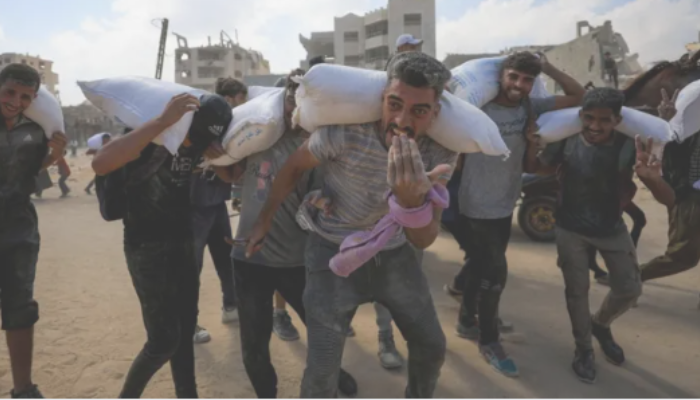
over what they describe as the “inhumane killing” of desperate civilians in Gaza who were seeking food and water. The group of nations—including France, Canada, Australia, Japan, New Zealand, and Switzerland—called for an immediate end to the Gaza war, describing the humanitarian situation as catastrophic.
Key Statement from 28 Nations
“The suffering of civilians in Gaza has reached new depths. The Israeli government’s aid delivery model is dangerous, fuels instability, and deprives Gazans of human dignity… It is horrifying that over 800 Palestinians have been killed while seeking aid.”
They condemned what they called the “drip feeding of aid” and accused Israel of systematically harming civilians trying to meet their most basic needs.
Context: Aid Blockade and Mass Casualties
According to Gaza’s Hamas-run health ministry, more than 100 Palestinians were killed over the weekend while waiting for food. An additional 19 people have reportedly died from malnutrition since Saturday alone. Hospitals, already crippled by bombardment and shortages, are unable to provide food or even baby formula for children.
The UN’s World Food Programme (WFP) warned that Gaza’s hunger crisis has reached “new levels of desperation,” with 90,000 women and children in urgent need of treatment for malnutrition.
“Hospitals can no longer feed patients or staff,” said Dr. Khalil al-Daqran of al-Aqsa Hospital, adding that children cry from hunger and flour prices have soared to $80 per kilogram.
srael Rejects the Accusations
In response, Israel’s foreign ministry rejected the statement, calling it “disconnected from reality” and claimed it sends the wrong message to Hamas, which it blames for prolonging the war and obstructing aid.
“Hamas is the only party responsible for the lack of a deal,” said Israeli spokesperson Oren Marmorstein. “They are spreading lies about Israel while deliberately increasing friction at aid sites.”
The Aid Controversy: UN vs. GHF
Since May, Israel and the U.S. have helped set up the Gaza Humanitarian Foundation (GHF) to distribute aid independently of the UN. However, the UN has refused to cooperate, citing safety concerns and violations of humanitarian neutrality.
The UN reported 674 killings near GHF aid sites in the past eight weeks and another 201 along UN convoy routes. On Saturday alone, 39 more people were killed near two GHF sites in Khan Younis and Rafah. On Sunday, 67 Palestinians were killed near a UN aid convoy in northern Gaza.
Israel said its troops fired warning shots to “remove immediate threats,” but disputed the death tolls.
UN and International Reaction
A spokesperson for UN Secretary General António Guterres said the “last lifelines keeping people alive are collapsing,” stressing Israel’s obligation to allow unrestricted humanitarian access.
UK Foreign Secretary David Lammy, while reiterating support for Israel’s right to security, said:
“A litany of horrors is taking place in Gaza, including the killing of desperate, starving children. Israel’s actions are doing untold damage to its global standing and long-term security.”
The UK pledged an additional £40 million in aid for Gaza this year.
Gaza’s Death Toll and Forced Displacement Concerns
The joint statement also condemned Israeli plans to move Gaza’s entire population into a so-called “humanitarian city” in Rafah, labeling it as permanent forced displacement—a clear violation of international humanitarian law.
The foreign ministers further warned they are prepared to take further action to support a permanent ceasefire and a political pathway to peace, widely seen as diplomatic code for recognizing a Palestinian state—a move still not adopted by key players like the UK and France.
What’s Next?
With Gaza’s death toll now exceeding 59,000, and a humanitarian system near total collapse, the international community is intensifying pressure on both Israel and Hamas to agree to an unconditional ceasefire. But with hostilities persisting and deep political divides, the pathway to peace remains uncertain.
